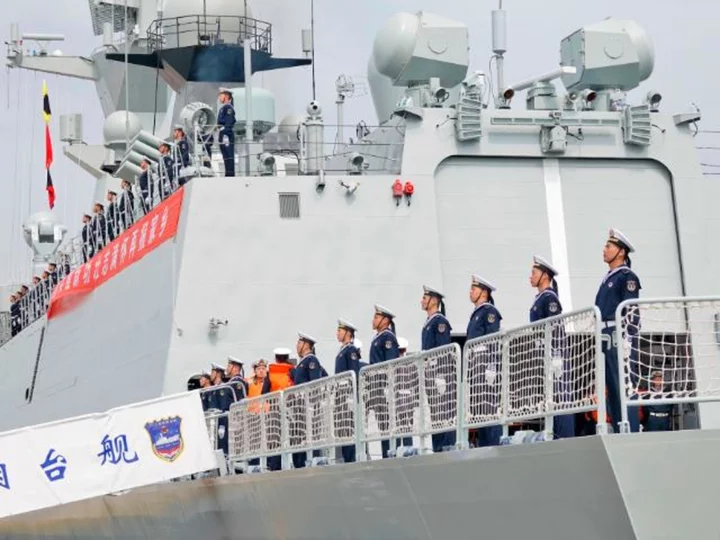China remains the "leading long-term challenge" to the existing international order and there is no evidence that Russia's faltering invasion of Ukraine has changed Beijing's thinking around "the timescale or methodology" for any potential attack on Taiwan, a top strategic think tank said ahead of a regional security summit in Singapore.
The grinding conflict in Europe may also accelerate trends in the Asia-Pacific region toward increased military spending and efforts to develop military capabilities, said a report released Friday by the International Institute for Strategic Studies (IISS), which hosts its annual Shangri-La Dialogue in Singapore this weekend.
The war and its reverberations in the Asia-Pacific region -- as well as the growing contest between the United States and China -- will be overarching themes at the security summit, the sidelines of which have long provided a platform for top security officials to meet face-to-face.
Attendees are expected to include US Secretary of Defense Lloyd Austin, Chinese Defense Minister Li Shangfu, Australian Prime Minister Anthony Albanese and Ukraine's Defense Minister Oleksii Reznikov.
US and Chinese defense chiefs are not expected to meet this year -- a mark of the depth of the fracture in relations between the two countries.
Austin on Thursday said it was "unfortunate" China declined a US offer to meet at the conference and warned the ongoing lack of communication could result in "an incident that could very, very quickly spiral out of control."
Beijing earlier this week refuted the claim it was blocking American defense officials' efforts to communicate, instead blaming the US for creating "artificial obstacles, seriously undermining mutual trust between the two militaries."
Focus on Taiwan
Concerns from the US and across the region over China's increasing assertiveness have grown in recent years as Beijing rapidly expanded its navy, militarized islands in the South China Sea, sought to forge security pacts in the South Pacific and ramped up rhetoric around disputed territorial claims.
Those concerns have sharpened over the past year, as Beijing twice staged extensive military drills around the island of Taiwan and refused to condemn Moscow's invasion of Ukraine.
That invasion has also drawn increased attention to Taiwan as a potential security flashpoint in Asia.
Despite broad differences with the geopolitical circumstances of Russia and Ukraine, the optics of a seemingly more powerful aggressor launching an attack driven by a vision of unification have heightened focus on China's intentions toward Taiwan.
China's ruling Communist Party claims the self-governing democracy as its own, despite never having controlled it, and has vowed to unify the island with the mainland, by force if necessary.
The IISS report released Friday, an annual assessment on Asia-Pacific security written by the think tank's experts, said there is no evidence the war in Ukraine has "altered Chinese thinking on the timescale or methodology" for a possible attack on Taiwan.
"Beijing's view of Taiwan as an internal challenge has shaped its assessment that a Chinese use of force to regain the island would be utterly dissimilar to the Ukraine war," the report said.
Chinese military thinkers had, however, analyzed the implications of Western support for Ukraine and the factors that contributed to Russia's poor military performance, according to the report.
It added that it was "impossible to determine whether China will use force to take Taiwan at some point in the future," and that Beijing's decision-making would be shaped not just by "an assessment of military capability but also by a consideration of likely US and allied non-military reactions," including potential economic impacts.
"There is no evidence that China has a fixed timetable for invading Taiwan," the report added.
Meanwhile, Beijing's rhetoric around Taiwan was one of several key triggers accounting for Japan's growing concern over China, the report said.
'Growing confrontation'
China was continuing to develop its "blue-water" capabilities to operate on the high seas far away from its ports, according to the report.
But the efforts of the US and its most important regional allies to increase their naval funding and readiness "could facilitate a shift in the naval balance in their favor," it said.
The US has made concerted efforts to bolster its security alliances and footprint in the region in recent years in the face of a rising China.
That has included strengthening trilateral cooperation with allies South Korea and Japan and revamping the Quad security grouping with Australia, Japan and India, widely seen as a counter to China's military rise.
Earlier this year, the US, the United Kingdom and Australia agreed to build a combined fleet of elite nuclear-powered submarines.
However, many regional states prefer to avoid taking sides in the "growing confrontation" between the US and China, the IISS report said, adding there is "no region-wide trend towards alignment with the US," due to economic dependencies and fear of escalation.
Beijing has repeatedly claimed its People's Liberation Army is a defensive force meant to safeguard world peace and development -- a point China's defense chief Li is expected to emphasize at the conference, where he will also discuss Beijing's vision for regional security.
It is Li's first time attending the conference since stepping into his role as defense minister earlier this year. Li was sanctioned by the US in 2018 over China's purchase of Russian weapons.
Both he and Austin are scheduled to deliver addresses to the conference, which runs from Friday to Sunday.

